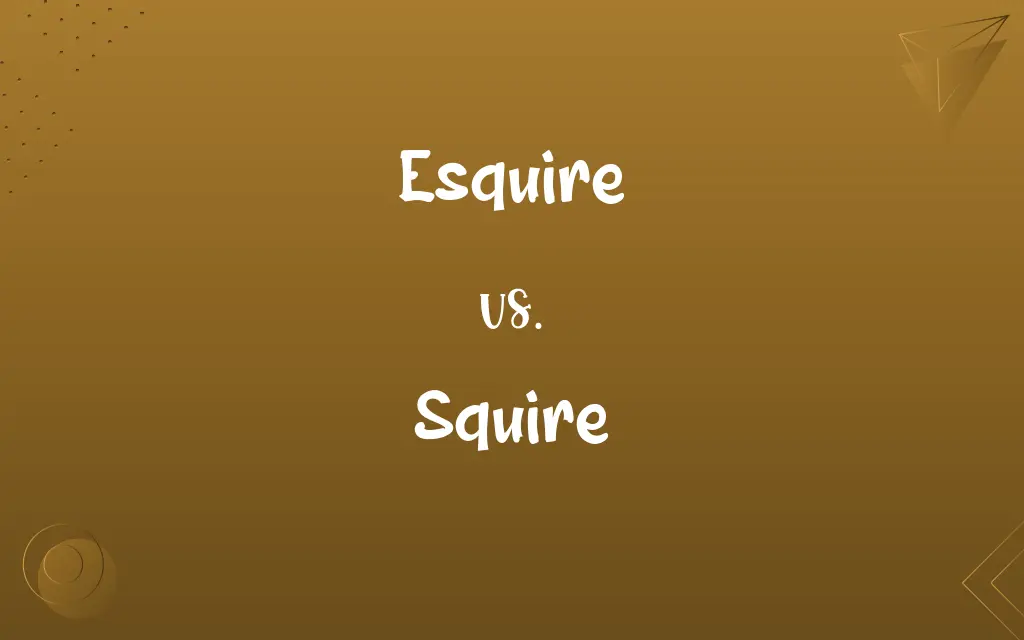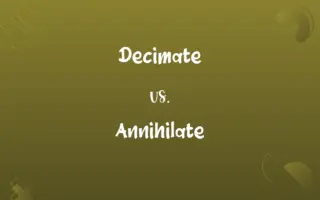Esquire vs. Squire: Know the Difference

By Shumaila Saeed || Updated on December 25, 2023
Esquire is a title used traditionally for men of higher social rank or in modern times as an informal title for lawyers, while squire refers to a young nobleman serving as an attendant to a knight before becoming a knight himself.

Key Differences
Historically, esquire denoted a rank above a gentleman but below a knight. Squire was used for a young nobleman as a knight's attendant. Both terms have medieval origins but have evolved differently in modern times.
Shumaila Saeed
Nov 30, 2023
Today, esquire is often used as a courtesy title for lawyers in the United States. In contrast, squire is rarely used in a contemporary context, mostly appearing in historical or literary works.
Shumaila Saeed
Nov 30, 2023
Esquire traditionally indicated a person of social stature without a higher title. Squire specifically referred to a knight-in-training, denoting a specific role in the feudal system.
Shumaila Saeed
Nov 30, 2023
The use of esquire varies, being more common in American legal contexts. Squire has a more universal historical usage but is now largely archaic.
Shumaila Saeed
Nov 30, 2023
The term esquire carried no specific duties historically, unlike squire, which entailed specific responsibilities in the service of a knight.
Shumaila Saeed
Nov 30, 2023
ADVERTISEMENT
Comparison Chart
Historical Meaning
A rank below knight, above gentleman
A young nobleman serving as a knight's attendant
Shumaila Saeed
Nov 30, 2023
Modern Usage
Informal title for lawyers, especially in the U.S.
Rarely used, mostly in historical/literary contexts
Shumaila Saeed
Nov 30, 2023
Social Status
Denoted a person of stature, often without nobility
Specific to knight-in-training in the feudal system
Shumaila Saeed
Nov 30, 2023
Regional Variations
More common in American English
Universally historical or archaic
Shumaila Saeed
Nov 30, 2023
Associated Duties
Historically no specific duties, now a professional title
Specific duties serving and learning from a knight
Shumaila Saeed
Nov 30, 2023
ADVERTISEMENT
Esquire and Squire Definitions
Esquire
Used as a courtesy title in formal address
The letter was addressed to James Smith, Esquire.
Shumaila Saeed
Nov 30, 2023
Squire
A young nobleman serving as an attendant to a knight
The squire assisted the knight in his duties.
Shumaila Saeed
Nov 30, 2023
Esquire
A title for lawyers in the U.S.
John Doe, Esquire, was the leading attorney.
Shumaila Saeed
Nov 30, 2023
Squire
In medieval times, a personal attendant to a knight
The squire was responsible for maintaining the knight's armor.
Shumaila Saeed
Nov 30, 2023
Esquire
A title indicating a certain level of education or accomplishment
After passing the bar, he could use 'Esquire' after his name.
Shumaila Saeed
Nov 30, 2023
ADVERTISEMENT
Squire
Used in literature to depict a young assistant or attendant
In the novel, the squire was a brave and loyal companion.
Shumaila Saeed
Nov 30, 2023
Esquire
In old British tradition, a title for landed gentry
As an esquire, he owned significant tracts of land.
Shumaila Saeed
Nov 30, 2023
Squire
An archaic term for an assistant in knightly duties
He served as a squire before being knighted.
Shumaila Saeed
Nov 30, 2023
Esquire
A man or boy who is a member of the gentry in England ranking directly below a knight.
Shumaila Saeed
Oct 19, 2023
Esquire
Abbr. Esq. Used as an honorific usually in its abbreviated form, especially after the name of an attorney or a consular officer
Jane Doe, Esq.
John Doe, Esq.
Shumaila Saeed
Oct 19, 2023
Squire
An English country gentleman, especially the chief landowner in a district.
Shumaila Saeed
Oct 19, 2023
Esquire
In medieval times, a candidate for knighthood who served a knight as an attendant and a shield bearer.
Shumaila Saeed
Oct 19, 2023
Squire
A young nobleman attendant upon a knight and ranked next below a knight in feudal hierarchy.
Shumaila Saeed
Oct 19, 2023
Squire
A title of dignity next in degree below knight, and above gentleman. See esquire.
Shumaila Saeed
Oct 19, 2023
Esquire
(archaic) A squire; a youth who in the hopes of becoming a knight attended upon a knight
Shumaila Saeed
Oct 19, 2023
Esquire
(heraldry) A bearing somewhat resembling a gyron, but extending across the field so that the point touches the opposite edge of the escutcheon.
Shumaila Saeed
Oct 19, 2023
Esquire
Originally, a shield-bearer or armor-bearer, an attendant on a knight; in modern times, a title of dignity next in degree below knight and above gentleman; also, a title of office and courtesy; - often shortened to squire.
Shumaila Saeed
Oct 19, 2023
Squire
(transitive) To attend as a beau, or gallant, for aid and protection.
Shumaila Saeed
Oct 19, 2023
Esquire
(Middle Ages) an attendant and shield bearer to a knight; a candidate for knighthood
Shumaila Saeed
Oct 19, 2023
Esquire
A title of respect for a member of the English gentry ranking just below a knight; placed after the name
Shumaila Saeed
Oct 19, 2023
Esquire
Historically, a man of higher social status below a knight
He was recognized as an esquire in his community.
Shumaila Saeed
Nov 30, 2023
Squire
A title of dignity next in degree below knight, and above gentleman. See Esquire.
Shumaila Saeed
Oct 19, 2023
Squire
A male attendant on a great personage; also (Colloq.), a devoted attendant or follower of a lady; a beau.
Shumaila Saeed
Oct 19, 2023
Squire
To attend as a beau, or gallant, for aid and protection; as, to squire a lady.
Shumaila Saeed
Oct 19, 2023
Squire
Historically, a knight-in-training
As a squire, he learned the arts of chivalry and combat.
Shumaila Saeed
Nov 30, 2023
Repeatedly Asked Queries
Can "Squire" be used in modern contexts?
Rarely, it's mostly historical or literary.
Shumaila Saeed
Nov 30, 2023
Can women be referred to as "Esquire"?
Yes, in the legal context, it's gender-neutral.
Shumaila Saeed
Nov 30, 2023
Are there modern equivalents to a squire?
Not directly, but internships in various fields can be a loose modern parallel.
Shumaila Saeed
Nov 30, 2023
Did squires receive formal education?
Their training was mostly practical, in combat and chivalry.
Shumaila Saeed
Nov 30, 2023
Were squires from noble families?
Generally, yes, they came from noble or well-off families.
Shumaila Saeed
Nov 30, 2023
Is "Esquire" a legal title?
Yes, in modern times, particularly in the U.S., for attorneys.
Shumaila Saeed
Nov 30, 2023
Does "Esquire" imply nobility?
Historically, yes, but not in its modern usage.
Shumaila Saeed
Nov 30, 2023
What age were squires typically?
Squires were usually young men, often teenagers.
Shumaila Saeed
Nov 30, 2023
Is "Esquire" a formal legal qualification?
No, it's a courtesy title, not a qualification.
Shumaila Saeed
Nov 30, 2023
Did squires participate in battles?
Yes, they often assisted knights in warfare.
Shumaila Saeed
Nov 30, 2023
Is "Esquire" used outside the legal field?
Rarely in modern times, it's primarily associated with law.
Shumaila Saeed
Nov 30, 2023
Can "Esquire" be used in formal address?
Yes, especially in written correspondence.
Shumaila Saeed
Nov 30, 2023
How is "Esquire" used in a legal context?
As a title after the name of a lawyer or attorney.
Shumaila Saeed
Nov 30, 2023
Does "Esquire" denote a specific level of lawyer?
No, it's used broadly for licensed attorneys.
Shumaila Saeed
Nov 30, 2023
How long did someone remain a squire?
Until they were knighted, typically in their late teens or early twenties.
Shumaila Saeed
Nov 30, 2023
Were squires paid for their service?
Not usually, as their training and upkeep were considered compensation.
Shumaila Saeed
Nov 30, 2023
Can "Esquire" be self-assigned?
Typically, it's used after passing the bar exam or receiving legal accreditation.
Shumaila Saeed
Nov 30, 2023
Is the role of a squire still relevant?
No, it's a historical term with no modern equivalent.
Shumaila Saeed
Nov 30, 2023
What duties did a squire have?
They maintained armor, horses, and assisted in various knightly duties.
Shumaila Saeed
Nov 30, 2023
Share this page
Link for your blog / website
HTML
Link to share via messenger
About Author
Written by
Shumaila SaeedShumaila Saeed, an expert content creator with 6 years of experience, specializes in distilling complex topics into easily digestible comparisons, shining a light on the nuances that both inform and educate readers with clarity and accuracy.









































































